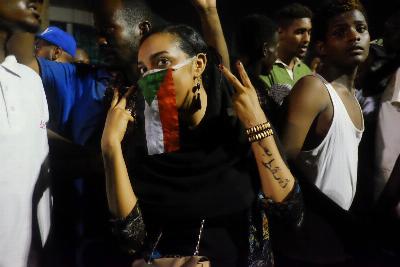Share
Human Rights Voices
While the UN devotes its human rights operations to the demonization of the democratic state of Israel above all others and condemns the United States more often than the vast majority of non-democracies around the world, the voices of real victims around the world must be heard.
Sudan, October 3, 2022
Sudan campaigners demand action after alarming rise in ‘honour killings’
Original source
Campaigners are calling for urgent action to tackle what they say is a rise in “honour killings” in Sudan.
Eleven women and girls have reportedly been killed by relatives so far this year, more than double the number reported in 2021. Two women have died in the past month.
Aisha Abakar died after an alleged attack by her father and brothers last week, after they reportedly learned that the unmarried 18-year-old from South Darfur state was pregnant. Her sister, aged 17, was reported to be in a critical condition in hospital after being injured in the same attack. Three men have been arrested.
Three days earlier, Tayeser Jumaa, 21, was allegedly killed by her brothers and cousins who believed that she was talking to men on her mobile phone, a campaigner told the Guardian. No arrests have been made.
Nahla Yousif, head of the Future Development Organisation, a women’s rights group based in South Darfur state, said the reported cases were the “tip of the iceberg”.
“I believe there are so many other similar crimes in the villages and towns that are far from the media. We only get to hear about those which are taken to the police,” she said. “It’s all about ignorance and lack of awareness, they think it’s shameful to see their daughters having relationships. These crimes have always been here, but they are now increasing due to the lack of accountability.”
Yousif said more younger women were being targeted because they owned mobile phones.
“Even the young women who are activists working in important fields documenting the abuses people go through in the [displacement] camps are now targeted by their relatives,” she said. “We have had to offer shelter to some women because they had smartphones and their relatives assumed they would be chatting with men.”
The majority of reported cases this year have occurred in Darfur, where for decades rape has been used as a weapon against women by the Janjaweed militias. Mohamed Hamdan Daglo, who founded the Janjaweed and is head of the feared Rapid Support Forces, is now vice-president of Sudan’s governing sovereign council.
Yousif said her organisation was planning protests to raise awareness of “honour killings” and was writing to the Darfur Bar Association to urge lawyers to push for cases to go to court, and not be quietly settled with families.
Sulaima Ishaq, head of the unit to stop violence against women in the Ministry of Social Affairs, said the rise in attacks was partly due to the coup in October last year, which had disrupted government institutions.
“There is no system in place, nothing is functioning, the judicial system is not working,” she said. “They [the government] are too busy releasing those who killed the martyrs during the revolution, despite saying that they did the coup for the safety and the security of the people of Sudan.”
Research conducted by the Arab Barometer in 2019 showed that more than a quarter of people over the age of 35 in Sudan thought that “honour killings” were acceptable.
In July, a Sudanese woman was sentenced to death by stoning for adultery for the first time in 10 years.
Domestic violence is not outlawed in Sudan.

